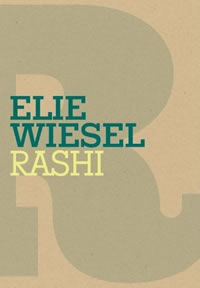Book Notes
 Elie Wiesel, Rashi (New York: Schocken Books, 2009), 111pp.
Elie Wiesel, Rashi (New York: Schocken Books, 2009), 111pp.
Elie Wiesel (b. 1928), professor at Boston University and winner of the 1986 Nobel Peace Prize, has written nearly sixty books. This little volume takes its place in a series of books by Schocken called Jewish Encounters, the purpose of which is to promote Jewish culture, ideas, and literature. About a dozen books have already been published in the series, with about twenty more forthcoming. Wiesel has written the volume on Rashi not so much because he might be his descendant or even out of a sense of intellectual obligation; rather, he says, "I think of Rashi and am overwhelmed by a strange nostalgia. . . Ever since childhood he has accompanied me with his insight and charm."
Solomon ben Isaac (Rabbi Shlomo Yitzhaki), later known by the shortened Rashi, was born around 1040 in Troyes, France; he died in 1105. Legends surround his birth and early years, and much is left to conjecture. We know that he had three daughters, but don't even know his wife's name. After studies in Germany, Rashi returned to Troyes and became the intellectual and spiritual leader of the Jewish community there of about 100 families. His commentary on the Bible (1475) was the first book to be printed in Hebrew.
After an introductory preface, in three short chapters Wiesel surveys the contributions of Rashi. He first considers his Biblical Commentaries, using Genesis as an example. His insights are "both deeply faithful to the sacred text and also the product of wild inventiveness that is both playful and serious, the work of human imagination and yet simultaneously a work of sacred interpretation." He then turns to Rashi's thoughts on Israel, its people, and the land. For Rashi, "the people of Israel live and act at the center of the history of men and of nations. A feeling of superiority? No, of singularity." And contrary to Christian claims, says Rashi, "the God of Israel did not change people and He never will: the people of Israel remain the true Israel for all time." In a final chapter Wiesel turns to "Sadness and Memory." Rashi was fifty-five when Pope Urban II issued his call for the First Crusade on November 27, 1095. Jews in Troyes faired better than many, but in other parts of Europe they faced forced conversions or slaughter. An interesting question arose for Jewish leaders: should a Jew who voluntarily converted to Christianity but then wanted to return to Judaism be received?
A chronology, glossary and short bibliography complete the book. In 1989 the Rashi Institute opened in Troyes to further Jewish scholarship. Wiesel's slender volume is no substitute for more scholarly works. Rather, it's a simple introduction written for a general audience about one of medieval Europe's greatest scholars and spiritual leaders.


